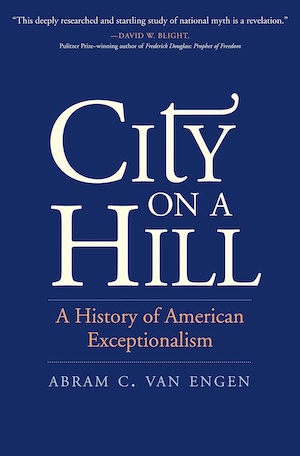By Fred H. Lawson
Referring to the United States of America as “a city on a hill” has become so commonplace that the history of the phrase has largely been taken for granted. Abram Van Engen shows that its putative origins, a 1630 address to newly-arriving Puritan settlers by John Winthrop, the governor of the Massachusetts Bay Colony, have little to do with its subsequent trajectory. Winthrop’s words languished unremarked until 1839, when they were rediscovered and published by the Massachusetts Historical Society. They quickly fell into obscurity once again until sometime in the early 1930s, when the prominent Harvard University historian Perry Miller set out to inject Winthrop’s rhetoric into the mainstream of American popular culture.
John F. Kennedy brought the notion of the USA as a city on a hill into the discourse of electoral politics, and Ronald Reagan elevated it into a catch-phrase for the resurgence of American power and prestige envisaged by his successive presidential campaigns. Consequently, Van Engen asserts, “Winthrop’s sermon came to fame only recently. It is, in many respects, a product of the Cold War.” In fact, calling the USA a city on a hill “did not become canonical until the 1960s.” Why it took so long for the trope to gain traction appears to have already been explored by Richard Gamble’s In Search of the City on a Hill: The Making and Unmaking of an American Myth (2012) and Daniel T. Rodgers’s As a City on a Hill: The Story of America’s Most Famous Lay Sermon (2018), but City on a Hill proposes to revisit the problem.
Most of Van Engen’s book recounts developments during the centuries in which Winthrop’s address lay moldering in the archives of the New York Historical Society and the pages of the Massachusetts Historical Society’s Collections. Two key points emerge from this rather disjointed narrative. First, Winthrop most likely had no intention of designating the Massachusetts Bay Colony, or America in general, as an exceptional place. “Winthrop and his followers never believed that God had set them apart single-handedly to save the world.” Instead, he was enjoining his audience to “become a model of Christian charity,” so that “this group of godly emigrants could, along with all other such communities spread throughout the world, demonstrate what a flourishing community of love actually looks like.” Second, Winthrop was attempting to embolden his fellow Puritans to stand firm in the face of persistent challenges from the Roman Catholic Church and the Church of England. Despite the overwhelming “visibility” of these two religious establishments, the “little flock” that disembarked at Boston would surely constitute a beacon to all people searching for the truth.
The later Kennedy-Reagan idea of America as a city on a hill gradually took shape alongside the territorial expansion of the USA and the expulsion of the American Indians from their ancestral lands, the formulation of a distinctly American nationalism—particularly through the codification of American history in commonly used textbooks—and the rise of American literature as a field of scholarship distinct from the study of English or European literature. Why these general trends culminated in the widespread public acceptance of Miller’s synthesis in the early 1930s is left unaddressed. Equally vague is whatever differences may exist between Van Engen’s analysis and those of Gamble and Rodgers, although tidbits of disagreements can be gleaned from the footnotes.
Perry Miller’s successor at Harvard, Sacvan Bercovitch, receives a lengthy critique, which rehashes several lines of argument advanced in earlier chapters. Van Engen intimates that Bercovitch influenced Reagan in some way, although he hints as well that the misconceptions harbored by the two men reflected a convergence of elite and popular attitudes regarding threats to American exceptionalism during the late 1970s. More vituperative criticism is reserved for Donald Trump: “The hazards of America First,” for instance, “come not from a sense of [national] election but from a worldview based in the utter absence of any higher moral good.” One wonders if the editors at Yale University Press tried to persuade the author to excise these largely superfluous sections, and keep the text riveted on the task of disentangling the complex and shifting relationship between Winthrop’s memorable expression and the vicissitudes of American exceptionalism.
Fred H. Lawson (ΦBK, Indiana University) is Professor of Government Emeritus of Mills College, and sometime Visiting Fellow of St. Antony’s College, Oxford.




